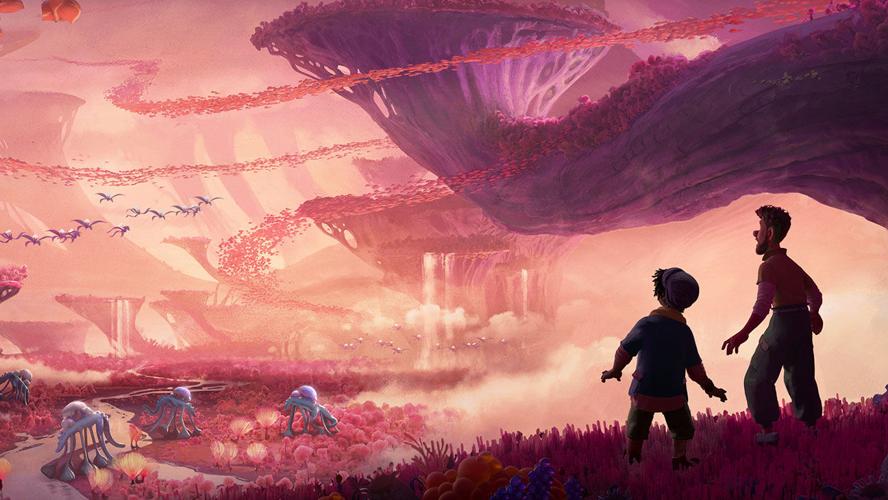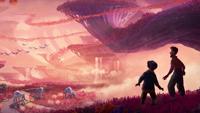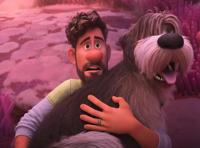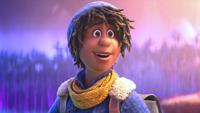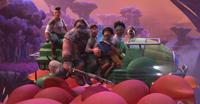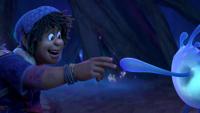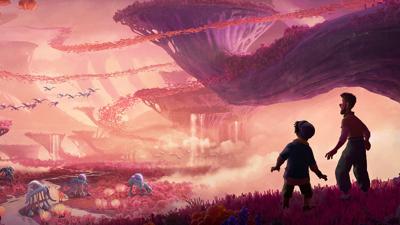Disney is celebrating its 100th year as an entertainment and animation company. Disney began in 1923, so next year will mark its centennial anniversary.
Strange World is the first to receive that Disney 100 branding. Technically, this is Disney's 61st animated feature. Oscar-winning director Don Hall and screenwriter Qui Nguyen have seemingly created a tale about climate change and fighting against it. This film focuses on a group of people who are destroying their environment because they're utilizing or mining a natural resource for electrical power. It's not a fossil fuel, but it's an obvious metaphor for gas and oil and how the desire for it is hurting or literally killing our planet.
This film is also a story about fathers and sons, as well as how fathers want their sons to follow in their footsteps. It's about legacy and passing down certain traits or qualities from one generation to another. This film simplifies it to vocation, where the father wants the son to have the same job or career as himself. It's about teenage rebellion, even though statistically many, if not most children follow in their parents' footsteps or end up very similar to their parents either socially, culturally or spiritually. What's reductive is that for all the progressiveness present here, this film argues between a binary choice when a third or fourth is just as likely.

Jake Gyllenhaal (Spider-Man: Far From Home and The Day After Tomorrow) stars as the voice of Searcher Clade, the son of a viking-like explorer who lives in a valley that is surrounded by insurmountable mountains. He and his father spend all their time exploring those mountains and attempting to climb them in order to get past the mountains and discover what's beyond them. Unfortunately, for all of Searcher's life, they've never done it. When Searcher becomes a teenager, he decides to give up on his father's Captain Ahab or Christopher Columbus-like obsession to see what's beyond the mountains.
This causes a rift, which splits up father and son. Searcher decides to stay in the valley and become a farmer. Eventually, Searcher grows up and has a wife and son. Searcher wants his son to become a farmer like him. His son though has an interest in learning about his grandfather and his explorations. This worries Searcher that his son will become an explorer and not a farmer. Just as Searcher had to decide between exploring versus farming, so does his son. The film never accepts that Searcher's son could be interested in some other vocation, such as science, art or some other trade.

Jaboukie Young-White (The Daily Show and Only Murders in the Building) co-stars as the voice of Ethan Clade, the son of Searcher. He's biracial and gay. Two things that don't factor into the film's larger theme of inter-generational legacy and what gets passed down or what a father would or wouldn't see in his son in terms of reflections of himself or previous generations. On the other side, this is a Disney film, so one shouldn't expect it to grapple with race or sexuality.
The film mainly depicts Ethan like most or many teenage protagonists in animated films, and even some live-action ones, as not actually able to act on romantic interests. Ethan is shy and awkward around his potential boyfriend. It's a way of acknowledging his homosexuality without having to show two boys kissing. Yet, the film has no problem depicting Searcher and his wife, Meridian, voiced by Gabrielle Union (Think Like a Man and Bad Boys II), kissing and making a particular spectacle of male-female attraction, or underline it in a more blatant way.

The plot is very much taken from Jules Verne or mirrors the Hollow Earth idea from the King Kong and Godzilla franchises. One might compare the narrative to Lightyear (2022) in that it's also about a group of people who get stranded in an "alien" environment. Imagery seems borrowed from Lightyear. Yet, the obvious analogy to how the environment looks in this film would be to Avatar (2009) in terms of colors and vistas. Yet, it's not trying to parallel some sphere in outer space. This film is paralleling some sphere within the Earth's crust or mantle.
It's about seeing a place, even a familiar place on Earth, in a new light or with new sense of wonder. It wants to have the same sense of awe as Jurassic Park (1993). However, it can't get beyond the CGI vomit that was the quantum realm in Ant-Man and the Wasp (2018). This film strains for Pixar emotionality but can't quite get there. It hits the beats of the Pixar formula, such as Up (2009), but can't quite have the same punch.

The film instead feels very derivative. It's not a problem if a film is derivative, meaning it references or even rips off other films, as long as it's doing so in a somewhat fresh way. This one doesn't. Yes, this film has a gay character in the center, but, beyond acknowledging that fact, this film does nothing with it. There's not much more different here than in A Wrinkle in Time (2018). If one has seen Star Trek: The Next Generation (1987), the twist at the end of that show's first episode titled "Encounter at Farpoint" is the same as the twist here. There's a gag here that was taken from Who Framed Roger Rabbit (1988). There's even an idea taken from Stephen King and his creation myth involving a turtle. There's really nothing that feels new here.
Hall and Nguyen blend all these derivative things together to tell a tale, which has an undercurrent of climate change activism. The salad of ideas though make for a rather bland meal with no spicy taste. The film hits us over the head with this parental notion of legacy through their children, but it never contextualizes why the legacy is so vital. Nor does it flesh out the relationships or society at large to a satisfying degree.

Rated PG for action and peril.
Running Time: 1 hr. and 42 mins.
In theaters.

